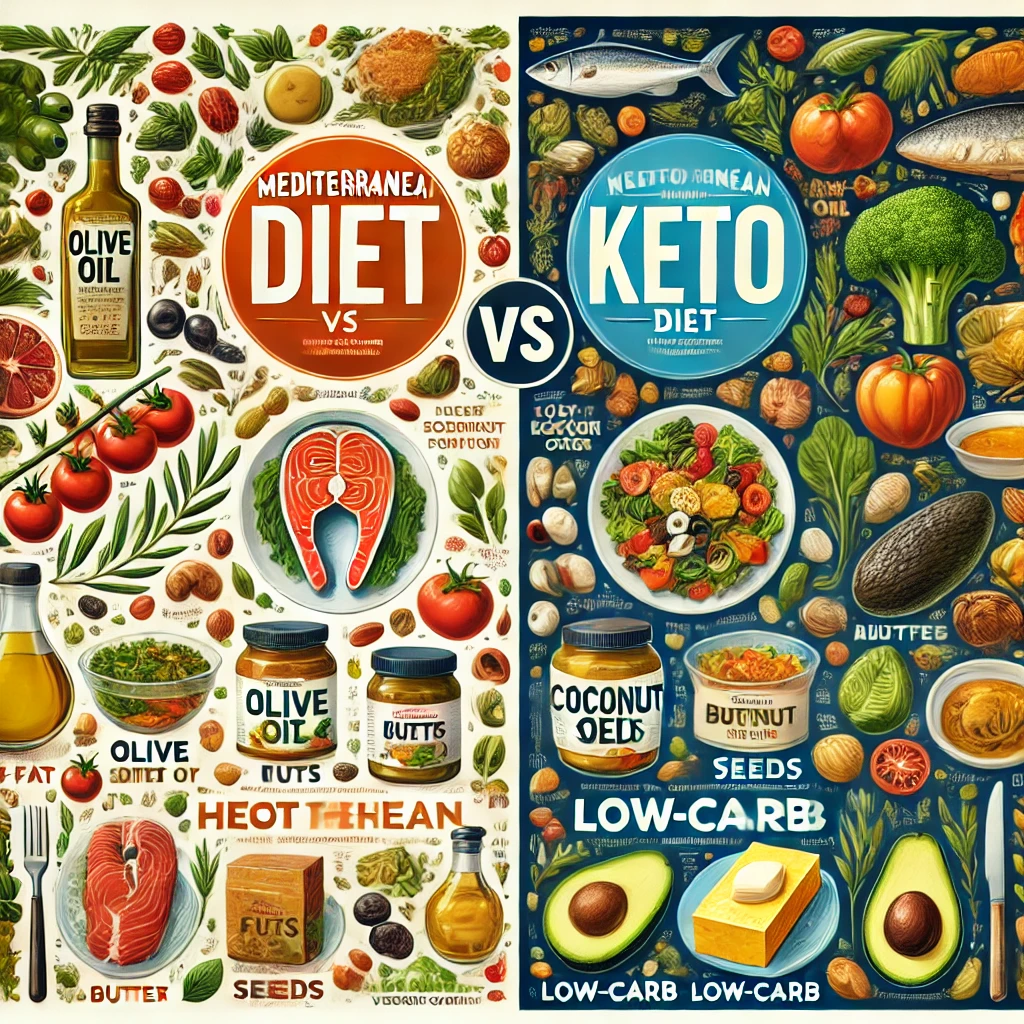Mediterranean Diet vs Keto, Find Out Which is The Best!
All Articles, Keto Diet
Table of Contents
- Introduction
- Nutritional Composition
- Health Benefits
- Potential Drawbacks
- Suitability for Different Individuals
- Studies Comparing Keto and Mediterranean Diets
- Mediterranean Diet vs Keto Diet Food Lists
- Conclusion
Introduction
The mediterranean diet vs keto diet are two well-known methods that are frequently used in conversations about diet and nutrition. Both have supporters and have demonstrated efficacy in various domains, ranging from reduction of body weight to general health advantages. However, how closely do they compare? This post will explore the difference between keto and mediterranean diet, looking at things like nutritional diversity, health advantages, disadvantages, and suitability for different people. We will address the important query, “is keto or mediterranean diet better?” and examine deep research.
Nutritional Composition
The Mediterranean Diet
The Mediterranean diet is inspired by the traditional eating patterns of countries bordering the Mediterranean Sea, such as Greece, Italy, and Spain. This diet emphasizes whole, unprocessed foods, and is rich in:
- Fruits and vegetables: These form the base of the diet, providing essential vitamins, minerals, and fiber.
- Whole grains: Foods like whole wheat, barley, and oats.
- Healthy fats: Predominantly from olive oil, nuts, and seeds.
- Lean proteins: From fish and poultry, with occasional red meat.
- Dairy: In the form of yogurt and cheese.
- Herbs and spices: Used generously for flavor.
The diet is low in refined sugars, processed foods, and saturated fats, making it a heart-healthy choice.
The Keto Diet
The ketogenic diet, or keto diet, is a high-fat, low-carbohydrate diet designed to put the body into a state of ketosis, where it burns fat for energy instead of carbohydrates. The typical macronutrient list for the keto diet is:
- Fats: 70-80% of daily calories intake, from sources like butter, oils, avocados, and fatty fish.
- Proteins: 20-25%, from meat, fish, eggs, and dairy.
- Carbohydrates: 5-10%, primarily from vegetables.
By significantly reducing carb intake, the keto diet forces the body to use fat as its primary source of energy, leading to significant weight loss and other health benefits.
Health Benefits
Weight Loss
One of the primary reasons why people choose between the keto diet vs mediterranean diet is weight loss. Both diets have been shown to be effective, but they work in different ways.
Keto for Weight Loss
The keto diet is very effective for rapid weight loss. By reducing carbs and increasing fats, the body enters the state of “ketosis”, which helps to burn fat more efficiently. Studies have shown that people on a keto diet can loose more weight in the short term compared to those on a traditional low-fat diets. A keto vs mediterranean diet study found that participants on a keto diet lost in average of 2.2 kg more over six months compared to those on a low-fat diets.
Mediterranean for Weight Loss
The Mediterranean diet promotes good, sustainable weight loss. Its focus on whole foods and balanced nutrition helps people to lose weight without feeling deprived. A study comparing the mediterranean diet vs keto for weight loss found that while the Mediterranean diet resulted in slower initial weight loss, participants were more likely to maintain their weight loss long term.
| Aspect | Keto Diet | Mediterranean Diet |
|---|---|---|
| Primary Mechanism | Ketosis – burning fat for energy | Balanced, sustainable approach |
| Initial Weight Loss | Rapid, significant | Gradual, sustainable |
| Long-term Weight Loss | Requires strict adherence | Easier to maintain long-term |
| Studies | Keto dieters lost 2.2 kg more in 6 months | Sustainable weight loss over the long term |
Heart Health
When considering which is better keto or mediterranean diet for heart health, the Mediterranean diet often is better.
Mediterranean Diet Benefits
The Mediterranean diet is known for its cardiovascular benefits. It is rich in antioxidants, healthy fats, and fiber, all of which contribute to lower levels of bad cholesterol (LDL) and higher levels of good cholesterol (HDL). Studies have shown that people on a Mediterranean diet have a lower risk of heart disease, stroke, and overall mortality.
Keto Diet Benefits
While the keto diet can improve some markers of heart health, such as triglyceride levels and HDL cholesterol, its long-term effects are less clear. High intake of saturated fats can potentially raise LDL cholesterol, posing a risk for heart disease if not carefully managed. Thus, it’s essential to focus on healthy fat sources like avocados and nuts.
Blood Sugar Control
Both diets can be beneficial for individuals with diabetes or at risk of developing diabetes, but they work differently.
Keto Diet for Blood Sugar
The keto diet can lower blood sugar levels and improve insulin sensitivity by reducing carbohydrate intake. This makes it an effective tool for managing type 2 diabetes and prediabetes.
Mediterranean Diet for Blood Sugar
The Mediterranean diet, with its attention on whole grains, fiber, and healthy fats, can also help manage blood sugar levels. It has been shown to reduce the risk of developing type 2 diabetes and improve glycemic control in individuals with diabetes.

Potential Drawbacks
Mediterranean Diet
While the Mediterranean diet is generally considered healthy and balanced, it does have potential drawbacks:
- Caloric Intake: The inclusion of healthy fats like olive oil and nuts can lead to high caloric intake, potentially leading to weight gain if portions are not controlled.
- Accessibility: Some ingredients, such as fresh fish and certain fruits, may not be readily available or affordable in all regions.
Keto Diet
The keto diet also comes with its own set of challenges:
- Restrictiveness: The drastic reduction in carbohydrates can be difficult to maintain long-term, leading to dietary fatigue and potential nutrient deficiencies.
- Keto Flu: Many individuals experience flu-like symptoms (headache, fatigue, nausea) when starting the diet, as the body adjusts to ketosis.
- Heart Health Risks: High intake of saturated fats can potentially raise LDL cholesterol, increasing the risk of heart disease if not carefully managed.
Suitability for Different Individuals
Who Should Consider the Mediterranean Diet?
The Mediterranean diet is suitable for most people, especially those looking for a sustainable, balanced diet that promotes overall health and longevity. It is particularly beneficial for individuals with a history of heart disease, those looking to manage weight gradually, and those seeking to improve their diet quality without severe restrictions.
Who Should Consider the Keto Diet?
The keto diet may be more suitable for individuals seeking rapid weight loss or those managing conditions like epilepsy, type 2 diabetes, or insulin resistance. However, it requires careful planning and monitoring, particularly in individuals with preexisting health conditions.
Studies Comparing Keto and Mediterranean Diets
Weight Loss Studies
A notable keto vs mediterranean diet study found that while the keto diet led to faster weight loss initially, the Mediterranean diet was more effective for long-term weight maintenance. Participants on the Mediterranean diet were also more likely to stick with their eating plan, highlighting its sustainability.
Heart Health Studies
Research on heart health has consistently shown the Mediterranean diet to be superior. One study revealed that individuals following a Mediterranean diet had a 30% lower risk of cardiovascular events compared to those on a low-fat diet. In contrast, the long-term cardiovascular effects of the keto diet remain less clear.
Mediterranean Diet vs Keto Diet Food Lists
Mediterranean Keto Diet Food List
For those interested in combining elements of both diets, a mediterranean keto diet food list can be a useful guide:
| Food Group | Mediterranean Diet | Keto Diet |
|---|---|---|
| Healthy Fats | Olive oil, avocados, nuts, seeds | Butter, coconut oil, avocados |
| Proteins | Fatty fish (like salmon), poultry, eggs | Beef, pork, chicken, fish |
| Low-Carb Vegetables | Leafy greens, zucchini, bell peppers | Broccoli, cauliflower, spinach |
| Dairy | Cheese, Greek yogurt (in moderation) | Cheese, cream, butter |
| Berries | Strawberries, blueberries (in limited amounts) | – |
Traditional Mediterranean Diet Food List
For those following a traditional Mediterranean diet, the focus is on:
- Fruits and Vegetables: Tomatoes, cucumbers, berries, leafy greens
- Whole Grains: Whole wheat bread, barley, quinoa
- Legumes: Lentils, chickpeas, beans
- Healthy Fats: Olive oil, nuts, seeds
- Lean Proteins: Fish, poultry, occasionally red meat
- Dairy: Yogurt, cheese
Traditional Keto Diet Food List
For those adhering strictly to the keto diet, the focus is on:
- Healthy Fats: Butter, coconut oil, avocados
- Proteins: Beef, pork, chicken, fish
- Low-Carb Vegetables: Broccoli, cauliflower, spinach
- Dairy: Cheese, cream, butter
- Nuts and Seeds: Almonds, walnuts, chia seeds

Conclusion
In the debate of mediterranean diet vs keto, there is no one-size-fits-all answer. Each diet has its unique benefits and potential drawbacks, making them suitable for different individuals based on their health goals, dietary preferences, and lifestyle.
For those seeking rapid weight loss and improved insulin sensitivity, the keto diet can be an effective choice. However, it requires careful planning and long-term commitment. On the other hand, the Mediterranean diet offers a balanced, sustainable approach to health, with a proven track record of promoting heart health and longevity.
Ultimately, the best diet is one that you can maintain in the long term and that fits your individual health needs. Whether you choose the keto or mediterranean diet, the key to success lies in making informed choices and focusing on overall dietary quality.
For further reading and detailed studies on the difference between keto and mediterranean diet, you can refer to the following resources:
- Mediterranean Diet Study – PDF
- Keto Diet and Weight Loss – PDF
- Heart Health and Mediterranean Diet – Wikipedia
In conclusion, whether you opt for the keto diet versus mediterranean diet, understanding the nuances and aligning them with your health goals is crucial for achieving and maintaining optimal health.